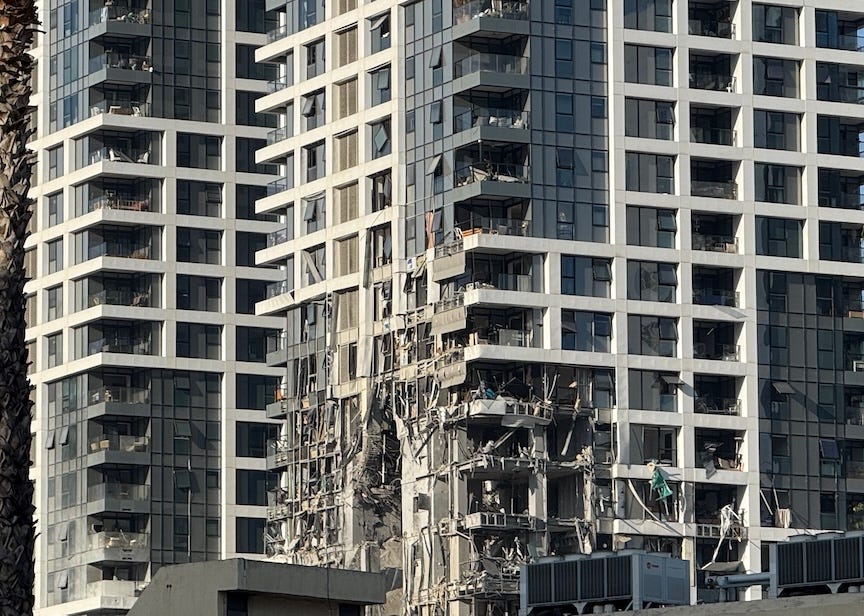DAY 635 OF THE WAR: Fighting in Gaza Claims Another Israeli Soldier; Ceasefire May be Nearing; Destroyed Homes Exacerbate Israel’s Housing Crisis
Tel Aviv Diary, July, 2025
It was a day of intense combat in northern Gaza. The violence began when an anti-tank rocket struck a building housing a team of Egoz soldiers, leaving several seriously wounded. Shortly afterward, a tank dispatched to locate the source of the fire was hit by another RPG, killing one crew member and injuring three others. Later in the day, two additional soldiers were wounded by sniper fire, and several others sustained injuries from an improvised explosive device (IED).
The soldier killed in the fighting was Sergeant Yaniv Michalovitch (19), from Rechovot. The incident occurred in the Shejaiya neighborhood of Gaza City, an area Israeli forces have reentered for the first time in many months. The precise objectives of the renewed operation remain unclear.
Hamas launched two rockets toward the Gaza Envelope yesterday, followed by two more aimed at Sderot today. In all instances, the missiles were intercepted by the Iron Dome system. Even after 635 days of conflict, rocket fire from Gaza continues.
Talk of a ceasefire, hostage release, or a broader end to the war—however one chooses to frame it— appears to be gaining momentum. President Trump reiterated his belief that an agreement could be reached as early as next week— claiming that Israel has already accepted the key terms. On the surface, this isn’t new; Israel agreed to the Witkoff framework some time ago. But increasingly, there’s a sense within Israel that the conversation has moved beyond that deal Witkoff proposed. What’s now on the table may be something far more significant: the potential end of the war.
There is a growing sentiment—not only among the Israeli public, but even within the cabinet, including members outside the far-right—that continued fighting may no longer yield meaningful results. While caution remains warranted, it is increasingly difficult to ignore the impression that the war may, at last, be nearing its end.
It’s difficult to see how much longer it can continue. With President Trump actively pushing for a resolution—and eager to claim a political victory in ending wars— it seems unlikely that Prime Minister Netanyahu will refuse, especially as the Israeli public is now firmly committed to bringing the conflict to a close.
A clear indication that the ceasefire effort is gaining traction came with Minister Ben-Gvir’s announcement that he had reached out to Finance Minister Smotrich to propose forming a united bloc to oppose the emerging agreement. In response, opposition leader Yair Lapid made it clear that he would back the government if Ben-Gvir and Smotrich choose to withdraw from the coalition.
While Prime Minister Netanyahu is likely reluctant to depend on Lapid’s support, he may now be open to the prospect of new elections—a possibility that remains uncertain. Regardless, for the first time in weeks, there is a sense of cautious optimism that a breakthrough may be imminent, perhaps even before Netanyahu lands in Washington next week.
AMAZON RESUMES ITS SHIPPING TO ISRAEL
Amazon announced today that it is resuming shipments to Israel, following a suspension during the recent 12-day conflict, when air traffic disruptions halted package deliveries. The company has not specified expected delivery times, leaving uncertainty about how quickly orders will arrive.
ISRAEL’S GROWING HOUSING CRISIS
At present, tens of thousands of Israelis are currently staying in hotels after their homes were either destroyed or so severely damaged that repairs could take months—if not longer. Under current policy, evacuees are entitled to two weeks of hotel accommodation, after which they are expected to find rental housing.
However, even before the war, the Tel Aviv area suffered from a chronic shortage of available rentals, a situation exacerbated in recent years by urban redevelopment projects that have forced residents to vacate temporarily. Now, with an influx of newly displaced families, securing long-term housing has become a near-impossible task.
At the same time, Israel faces a massive reconstruction challenge as it works to rebuild the extensive damage caused by the war. The Association of Contractors estimates that an additional 40,000 foreign workers will be needed to sustain new housing construction while simultaneously repairing and rebuilding tens of thousands of damaged apartments.
The scale of destruction is significant: approximately 60 buildings are slated for complete demolition, and more than 1,000 apartments require full reconstruction. The total extent of the damage is still being assessed, with ongoing disputes between municipal engineers and Tax Authority officials over the safety evaluations of affected structures.
Since the war began, Israel has barred Palestinian workers from entering the country—a move that has severely impacted the construction sector, which has long relied on their labor.
A new framework agreement between government ministries, local municipalities, and the Contractors Association will enable cities to hire major construction firms to carry out large-scale repair projects. This initiative is designed to complement existing programs that allow individual apartment owners to manage their own renovations independently.
Under the arrangement, local authorities will maintain lists of approved contractors. If residents of a damaged building can reach consensus on a single contractor, repair work can proceed in coordination with the municipality. Rather than applying uniform repair standards, construction plans will be customized to reflect the specific damage and original construction specifications of each building.
Despite the comprehensive reconstruction plans, serious workforce challenges remain. The Housing Ministry projects the arrival of 5,000 additional foreign workers by the end of the year, including 3,000 from China through an expedited processing track. However, industry experts warn that many of these workers lack the specialized skills required for renovation work.
The Association of Renovation Contractors has sharply criticized the government's approach, pointing out that since October 7, 2023, only 250 workers trained specifically in renovation have been brought into the country—compared to tens of thousands recruited for general construction. This mismatch has raised concerns that many displaced residents currently living in hotels may ultimately be rehoused in substandard units built to the bare minimum specifications of subsidized housing, rather than receiving proper, high-quality rehabilitation.
As one industry insider put it, “It looks like in two years, the state comptroller will be investigating why we failed to deliver adequate replacement housing for citizens made homeless by the war.”
My two appearances on i24 News today:
BUSINESS
flō Optics
Mitsui Chemicals Invests in Israeli Startup to Revolutionize Optical Lens Coating
Japanese materials giant Mitsui Chemicals, which generates $12 billion in annual
Keep reading with a 7-day free trial
Subscribe to Tel Aviv Diary to keep reading this post and get 7 days of free access to the full post archives.






